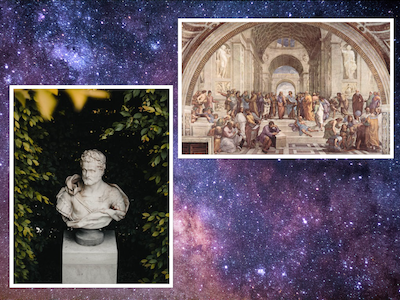

For many, the word ‘philosopher’ will evoke the image of a toga-clad, sandal-wearing elderly Greek man of ancient times… But perhaps that’s because we’re not incorporating enough philosophy into our day-to-day lives.
That’s the view of Beaulieu student Arabella Knight, who is making the case for everyone from school students to scientists and politicians to broaden their minds with philosophical thinking…
“A philosopher is someone who studies issues concerning matters such as existence, knowledge, values, mind and language according to the general definition… but philosophy is so much more than that, and can help us in our daily lives.
Philosophy helps broaden our understanding of the world around us, influencing the way we think, and, in turn, how we express that through art.

Pictured: Would we have as many styles of art without a bit of out-of-the-box philosophical thinking?
Art might be based on basic principles – form, line, shape, proportion, etc – but yet the styles produced by different individuals following the same principles are diverse, ranging from fine art to pop art, surrealism, abstract, and futurism. Each of these has been developed by someone with a different way of looking at reality, who was brave enough to share that with the world.
Perhaps, without a philosophical mindset, we wouldn’t have some of the art influencers we have today.
Communication is key in the modern world – even when it’s with people with whom we disagree.
The study of philosophy helps us to develop and express what our independent views are, and helps us to develop convincing arguments in day-to-day debates, but also helps us to communicate with each other, reacting to each other’s beliefs, values and opinions.

Pictured: Consideration of philosophical issues encourages us to challenge others' views in a considerate way.
As well as developing our opinions and ability to express them, philosophy also importantly teaches us how to challenge things.
That can have a specific benefit for scientists, for example, as it pushes them to consider challenging questions, such as, “How did the planet come to be?”
Philosophy teaches us not to dismiss some questions as “ludicrous” – “Is there possibly life on other planets?” for example – but to properly consider them.

Pictured: Incorporating philosophy as a subject in schools could benefit students in other lessons, such as science, by encouraging them to think about the big questions.
Major scientific advancement has been based around the two questions I’ve mentioned, and they’ve come from people who were thinking outside of the box and were thinking in a philosophical way.
The very word philosophy comes from the Greek ‘philo’ (love) and ‘-sophos’ (wisdom). So the literal meaning is ‘love of wisdom’.
I think that philosophy should be a staple in schools because it helps students to explore their different views and beliefs and have debates on them. This helps propel both their learning and keenness to delve deeper into different topics.
Aside from the academic and mind-broadening benefits, islanders and politicians having a philosophical outlook could have a very real outcome when it comes to specific local issues.
For example, philosophy encourages us to consider ‘the greater good’ rather than seeing things in purely financial terms.

Pictured: Would we look at arts funding differently if we were to consider the importance of art from a philosophical perspective?
Although it may not benefit the government money-wise, helping our coastal environment, tackling pollution of plastics and supporting local charities that are helping our environment will have a beneficial impact on our wildlife.
Meanwhile, Jersey’s creative community at the Arts Centre and Opera House are struggling and I believe that the government needs to think more about the ‘greater good’ in terms on how funding would support them in the long-term and encourage local creativity. Maybe their view of the importance of the arts in developing the mind would be different with a philosophical mindset.
The core subjects for schools are English, Maths, and Science… but isn't something missing?
I believe that incorporating Philosophy as a core subject will highly benefit students and help them to express their views and opinions creatively. This will teach students on not only how to debate and perform convincing arguments, but it will also expand their knowledge about their surroundings and help them to make decisions that make the world a better place."
Arabella Knight wrote this piece while on Trident work experience with Express.
Comments
Comments on this story express the views of the commentator only, not Bailiwick Publishing. We are unable to guarantee the accuracy of any of those comments.